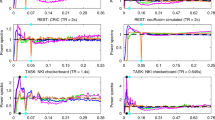Abstract
Data-driven methods have been successfully used in functional magnetic resonance imaging (fMRI) data analysis, utilizing no explicit prior information. However, in analysis of task fMRI, incorporating prior information about paradigms would be useful to improve the power in detecting desired activations. In this paper, we incorporated the experimental paradigm information into canonical correlation analysis (CCA) model and proposed a temporal constrained CCA approach. Comparing to noise and artifact signal, the response BOLD signal from activated regions changes only after stimulus begin. By incorporating the difference before and after stimulus, the spatial patterns which respond well to stimulus-occurrence become manifest, and the activations can be detected more accurately. Comparisons on simulated data indicated that incorporating prior information about paradigm can improve the accuracy of CCA on activation detection. The proposed method obtained more accurate and robust results than conventional CCA and showed improved power in activation detection than pure data-driven methods.
Access this chapter
Tax calculation will be finalised at checkout
Purchases are for personal use only
Similar content being viewed by others
References
Cheriyan, M.M., Michael, P.A., Kumar, A.: Blind source separation with mixture models – a hybrid approach to MR brain classification. Magn. Reson. Imaging 54, 137–147 (2018)
Sun, X., Xu, J., Ma, Y., Zhao, T., Ou, S.: Single-channel blind source separation based on attentional generative adversarial network. J. Ambient. Intell. Humaniz. Comput. 13(3), 1443–1450 (2020). https://doi.org/10.1007/s12652-020-02679-4
Lee, K., Tak, S., Ye, J.C.: A data-driven sparse GLM for fMRI analysis using sparse dictionary learning with MDL criterion. IEEE Trans. Med. Imaging 30(5), 1076–1089 (2011)
Li, H., Correa, N.M., Rodriguez, P.A., Calhoun, V.D., Adali, T.: Application of independent component analysis with adaptive density model to complex-valued fMRI data. IEEE Trans. Biomed. Eng. 58(10), 2794–2803 (2011)
Andersen, A.H., Gash, D.M., Avison, M.J.: Principal component analysis of the dynamic response measured by fMRI: a generalized linear systems framework. Magn. Reson. Imaging 17(6), 795–815 (1999)
Zhang, W., Lv, J., Li, X., Zhu, D., Jiang, X.: Experimental comparisons of sparse dictionary learning and independent component analysis for brain network inference from fMRI data. IEEE Trans. Biomed. Eng. 66(1), 289–299 (2019)
Valente, G., De Martino, F., Filosa, G., Balsi, M., Formisano, E.: Optimizing ICA in fMRI using information on spatial regularities of the sources. Magn. Reson. Imaging 27(8), 1110–1119 (2009)
Wu, X., Zeng, L.-L., Shen, H., Li, M., Hu, Y., Hu, D.: Blind source separation of functional MRI scans of the human brain based on canonical correlation analysis. Neurocomputing 269, 220–225 (2017)
Zhang, Y., Li, M., Shen, H., Zeng, L.-L., Hu, D.: A robust multi-subject fMRI analysis method using dimensional optimization. IEEE Access 7, 125762–125770 (2019)
Calhoun, V.D., Adali, T., Stevens, M.C., Kiehl, K.A., Pekar, J.J.: Semi-blind ICA of fMRI: a method for utilizing hypothesis-derived time courses in a spatial ICA analysis. Neuroimage 25(2), 527–538 (2005)
Wei, L., Rajapakse, J.C.: Approach and applications of constrained ICA. IEEE Trans. Neural Netw. 16(1), 203–212 (2005)
Rasheed, T., Lee, Y.-K., Kim, T.-S.: Constrained spatiotemporal ICA and its application for fMRI data analysis. In: Lim, C.T., Goh, J.C.H. (eds.) 13th International Conference on Biomedical Engineering, pp. 555–558. Springer Berlin Heidelberg, Berlin, Heidelberg (2009). https://doi.org/10.1007/978-3-540-92841-6_136
Wang, Z., Xia, M., Jin, Z., Yao, L., Long, Z.: Temporally and spatially constrained ICA of fMRI data analysis. PLoS ONE 9(4), e94211 (2014)
Erhardt, E.B., Allen, E.A., Wei, Y., Eichele, T., Calhoun, V.D.: SimTB, a simulation toolbox for fMRI data under a model of spatiotemporal separability. Neuroimage 59(4), 4160–4167 (2012)
Geissler, A., Gartus, A., Foki, T., Tahamtan, A.R., Beisteiner, R., Barth, M.: Contrast-to-noise ratio (CNR) as a quality parameter in fMRI. J. Magn. Reson. Imaging 25(6), 1263–1270 (2007)
Author information
Authors and Affiliations
Corresponding author
Editor information
Editors and Affiliations
Rights and permissions
Copyright information
© 2023 The Author(s), under exclusive license to Springer Nature Singapore Pte Ltd.
About this paper
Cite this paper
Li, M., Zhang, Y., Tang, P., Hu, D. (2023). Constrained Canonical Correlation Analysis for fMRI Analysis Utilizing Experimental Paradigm Information. In: Sun, F., Cangelosi, A., Zhang, J., Yu, Y., Liu, H., Fang, B. (eds) Cognitive Systems and Information Processing. ICCSIP 2022. Communications in Computer and Information Science, vol 1787. Springer, Singapore. https://doi.org/10.1007/978-981-99-0617-8_8
Download citation
DOI: https://doi.org/10.1007/978-981-99-0617-8_8
Published:
Publisher Name: Springer, Singapore
Print ISBN: 978-981-99-0616-1
Online ISBN: 978-981-99-0617-8
eBook Packages: Computer ScienceComputer Science (R0)




